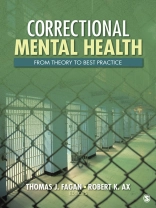A research-to-practice text offering a biopsychosocial approach to treating criminal offenders
Correctional Mental Health is a broad-based, balanced guide for students who are learning to treat criminal offenders in a correctional mental health practice. Featuring a wide selection of readings, this edited text offers a thorough grounding in theory, current research, professional practice, and clinical experience. It emphasizes a biopsychosocial approach to caring for the estimated 20% of all U.S. prisoners who have a serious mental disorder. Providing a balance between theoretical and practical perspectives throughout, the text also provides readers with a big-picture framework for assessing current correctional mental health and criminal justice issues, offering clear strategies for addressing these challenges.
Cuprins
SECTION ONE: CORRECTIONAL PRACTICE: INTRODUCTION AND FOUNDATION
1. Criminal Justice and Mental Health Systems: The New Continuum of Care System – Thomas Fagan, Dyona Augustin
2. Comparison of Correctional and Community Mental Health Service Delivery Models – Robert Powitzky
3. Managing the Mentally Ill from a Correctional Administrator′s Perspective – Peter M. Carlson
SECTION TWO: ENTERING CORRECTIONAL PRACTICE
4. Clinical Assessment in Correctional Settings – Daryl G. Kroner, Jeremy F. Mills, Andrew Gray and Kelly O. N. Talbert
5. Correctional Treatment – Donald A. Sawyer, Catherine Moffitt
6. Issues in Multicultural Correctional Assessment and Treatment – Corinne N. Ortega
7. Clinical Psychopharmacology in Correctional Settings – Gollapudi S. Shankar
8. Interdisciplinary Collaboration in Correctional Practice – Dean Aufderheide and John D. Baxter
SECTION THREE: WORKING WITH SPECIAL POPULATIONS
9. Offenders with Severe and Persistent Mental Illness – Rebecca L. Bauer, Robert D. Morgan and Jon T. Mandracchia
10. Mental Health Needs of Female Offenders – Ann Booker Loper and Lacey Levitt
11. Substance Abuse and Co-occurring Disorders among Criminal Offenders – David J. Stephens
12. Assessment and Treatment of Incarcerated Sex Offenders – Shelia M. Brandt and Michael Thompson
13. Juvenile Offenders – Debra De Prato and Stephen W. Phillippi
14. Managing Disruptive Offenders: A Behavioral Perspective – Steven J. Helfand
15. Understanding the Broad Corrections Environment: Responding to the Needs of Diverse Inmates – Alix M. Mc Learen and Phillip R. Magaletta
SECTION FOUR: THE FUTURE OF CORRECTIONAL MENTAL HEALTH PRACTICE
16. Correctional Mental Health: A Best Practices Future – Robert K. Ax
Despre autor
Robert K. Ax, Ph.D., received his doctorate in clinical psychology from Virginia Polytechnic Institute and State University, and practiced in state and federal corrections for more than 20 years. He is a licensed clinical psychologist (Virginia), a Fellow of the American Psychological Association (APA), a member of the Canadian Psychological Association (CPA), and a former President of the APA Division of Psychologists in Public Service (18). He has twice been the recipient of Division 18’s Distinguished Service Award, and in 2009 received its highest honor, the Harold Hildreth Award. He was the training director of the Federal Bureau of Prisons’ first APA-accredited internship program at the Federal Correctional Institution, Petersburg, Virginia. Dr. Ax is the co-editor, with Dr. Thomas J. Fagan, of two previous volumes, the Correctional Mental Health Handbook, published by Sage in 2003, and Corrections, Mental Health and Social Policy: International Perspectives (Charles C Thomas, 2007). He has published articles on mental health training and correctional issues, currently serves on the editorial board of the journal Criminal Justice and Behavior, and has served as an invited reviewer for other journals, including American Psychologist, Psychological Services, and Professional Psychology: Research and Practice.Dr. Ax has published several articles on organized psychology’s prescriptive authority initiative as well. He delivered an invited address on this issue at the annual CPA convention in 2008, and served as a content expert (1998-1999) for the development of the APA College of Professional Psychology’s Psychopharmacology Examination for Psychologists. Dr. Ax received the American Society for the Advancement of Pharmacotherapy’s (APA’s Division 55) National Leadership Award in 2006.












